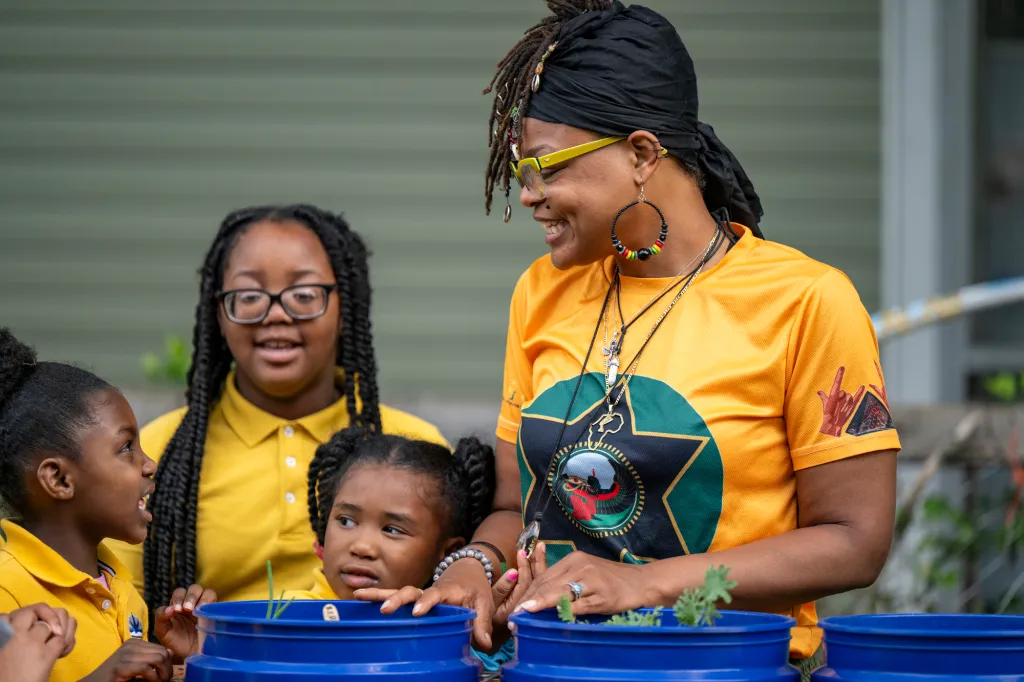Haughville school uses urban farming to teach students how to start their own gardens
(MIRROR INDY) — Kris Duckett calls herself the builder.
The art and electives teacher at Allegiant Preparatory Academy on the west side runs lunch and recess duty at the start of her day and covers the reception desk before teaching anywhere from one to three classes in the afternoon.
But, before she starts her work day at the K-5 Haughville charter school, she checks in on “her babies” — the dozens of herbs and other plants grown with care on the Allegiant Prep campus.
Duckett, who is also a minister and community educator, helped the school launch an elective program this year in regenerative urban farming. She and founder Stebo Ma’at also lead programs at Ma’at Urban Agriculture & Industries, which offers free workshops and certifications in regenerative farming and partners with schools and community groups across Indianapolis to grow holistic gardening practices.
On May 6, second graders at Allegiant Prep placed mulch atop the soil of a dozen five-gallon buckets containing radishes, collard greens and kale, among other plants at the school. As students lined up to take their turn spreading mulch across the buckets, Duckett picked off pieces of onion, handing them to students.
“I never tried it before, but I’m going to try it,” second grader Londyn Jones said before declaring, “I’m going to plant this at home!”
Students learn about regenerative practices — which can include reusing organic materials and collecting rainwater — so they can start their own small gardens at home.
The students also build up skills of determination and self-sufficiency in an area of the city where accessibility to quality food can be a challenge.
“For us, it’s really important to make sure we are giving back to the people who live here,” Duckett said. “We feel like we can saturate the community with growing spaces and with enough growing spaces, we can make food free.”
Students can work up to garden “manager” roles
Students at Allegiant Prep can work in the school’s growing garden once a week during their 25-minute elective period — an incentive for students who are caught up on their homework and have exhibited good behavior during the week.
Duckett assigns out jobs to each student, allowing them to work up to “manager” roles.
She teaches the students different aspects of farming including the basics, such as the difference between dirt and soil, and more advanced concepts, such as which plants to grow together to deter bugs and pesky neighborhood squirrels from snacking on their crop.
The program aligns with some state standards students are taught in their classes, said Rick Anderson, Allegiant Prep’s head of school. Not only do the students learn about how to plant and care for the garden, but they’re also taught about nutrition and where their food comes from.

“We really have a big focus on developing the skills, mindsets and habits for students to not only be successful in school, but in life,” Anderson said. “So, we’re doing something that complements our educational model.”
Anderson said Allegiant Prep is looking to expand the program into an after-school club and is exploring ways students can take produce home with them to eat or use to create their own gardens. Duckett wants to plan an end-of-the-year garden party and to sell some of the plants as a fundraiser for the program.
About 25 Allegiant students are on track to earn a regenerative urban farming certification that allows them to train alongside adult farmers. To earn the certification, the students participate in a regenerative farming curriculum and take quizzes about what they’ve learned.
Duckett and Ma’at also offer free monthly training for adults. Their goal is to empower entire families to give sustainable farming a try.
“It was (Ma’at’s) idea to say ‘we really need to reach the children,’” Ducket said, “‘Because, the children are the future and the children are going to be the ones that take over for us.’”

How to start your own regenerative urban farm
You don’t have to have a large backyard or break your budget to start your own urban farm.
Duckett encourages the students and adults she teaches to look for opportunities all around them. For example, each Indianapolis Public Library branch keeps a seed library and makes free seed packets available each growing season.
Duckett often finds good deals on small planters at the Dollar Tree and five-gallon buckets can be found for $5 or less at hardware stores. Some restaurants give away similar buckets they use for food prep for free if you ask.
Scrap wood pallets can be used to create a stand for your rain garden and expensive soil can be supplemented with old wood, mulch and cardboard compost.
Need some extra pointers to get started? Ma’at Urban Agriculture & Industries offers a free one-hour workshop at 10 a.m. every third Saturday of the month at Belmont Beach in Haughville. The group also provides a daylong regenerative urban farming training at 10 a.m. every fourth Saturday at the 16 Tech Innovation District. All workshops are family-friendly.
Ma-at Urban Agriculture & Industries also shares virtual resources on its website.
Mirror Indy reporter Carley Lanich covers early childhood and K-12 education. Contact her at carley.lanich@mirrorindy.org or follow her on X @carleylanich.
